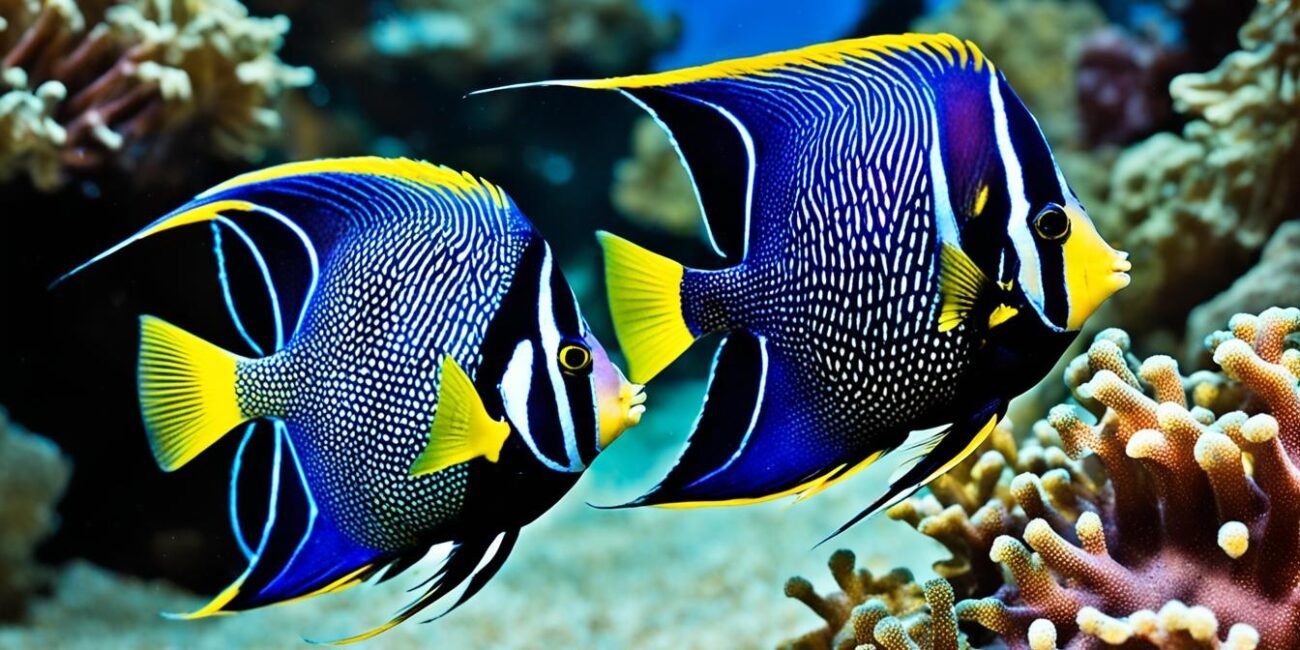As I sit by the tranquil aquarium, mesmerized by the graceful movements of the angelfish, I can’t help but wonder about their intriguing pairing behavior. Do these elegant creatures form lifelong bonds like some of their animal counterparts? Are they capable of experiencing a deep and lasting love, just as humans do?
The concept of monogamy fascinates me. The idea of two beings committing to each other, forging a bond that withstands the tests of time, is undeniably captivating. We humans often seek that kind of connection, yearning for a partner who will journey with us through the ups and downs of life. But what about the angelfish?
Through my research, I discovered that angelfish do indeed have a unique mating behavior that suggests a lifelong commitment to their partners. These monogamous creatures form a strong bond with their chosen mate and remain together for an extended period, if not for life.
Key Takeaways:
- Angelfish exhibit monogamous behavior, forming lifelong pair bonds.
- They demonstrate a commitment to their chosen mate, traveling, hunting, and living together.
- Angelfish pairing behavior suggests a deep and enduring connection.
- Monogamy in the animal kingdom provides valuable insights into the nature of relationships.
- Exploring the monogamous habits of animals can inspire humans to cultivate stronger connections in their own lives.
Monogamous Animals in the Animal Kingdom
True monogamy exists among certain species in the animal kingdom. While fidelity varies, many animals form a lifetime pair bond for reasons like raising offspring and survival. This section introduces the concept of monogamy in the animal kingdom and how humans can learn from these faithful animal pairs.
Monogamy, the practice of a singular, lifelong mating partnership, is a behavior not limited to humans. Many animals have also embraced this committed and faithful approach to reproduction and pair bonding. By observing these monogamous animals, we can gain insights into the benefits and challenges of maintaining long-term relationships.
Monogamy in the animal kingdom serves various purposes. For some species, it is a strategy to ensure successful reproduction and the survival of their offspring. By forming strong bonds, monogamous animals can share the responsibilities of raising young, protecting their territory, and foraging for food. Additionally, by engaging in cooperative behaviors, these animals increase their chances of survival in harsh environments.
The Benefits of Monogamy in the Animal Kingdom
Monogamy provides several advantages for animal pairs. By staying committed to their partners, animals can establish and maintain a stable family unit, which allows for efficient parenting and division of labor. This stability also enables the establishment and defense of territory, ensuring access to essential resources.
Monogamous animal pairs often exhibit strong bonds and cooperation, supporting each other in various aspects of their lives. This loyalty contributes to the overall success and well-being of both individuals and their offspring.
Let’s take a closer look at some notable examples of monogamous animals:
| Animal | Behavior | Benefits |
|---|---|---|
| Swans | Form lifelong pair bonds, share territory and parenting duties. | Stable family unit, successful reproduction, and defense against threats. |
| Arctic Wolves | Alpha male and alpha female establish a dominant pair bond, leading the pack. | Cooperative hunting and defense, successful rearing of offspring. |
| Albatrosses | Engage in elaborate courtship rituals, mate for life, share parenting duties. | Strong pair bond, successful reproduction, and shared responsibility. |
| Gibbons | Mate for life, exhibit grooming and territorial behaviors together. | Strong companionship, cooperative behaviors, thriving offspring. |
These examples highlight the diverse ways in which monogamy manifests in the animal kingdom. From birds to mammals, loyalty and commitment play a significant role in the reproductive success and survival of these monogamous species. By remaining faithful and supportive of their partners, these animals exemplify qualities that humans can admire and learn from in our own relationships.
Swan: The Symbol of True Love
Swans are known for their monogamous behavior, often depicted as the symbol of true love. They form pair bonds that can last for many years, and in some cases, for life. For swans, monogamy is about survival rather than romantic love. The demands of migration, territory establishment, and raising young make it beneficial to have a lifelong partner.
Swans are captivating creatures with their elegance and grace. Their commitment to their partners is unwavering, and they are dedicated to each other through thick and thin. Whether gracefully gliding across the water or building their nests together, swans exemplify the beauty of monogamy in the animal kingdom.
Mating for life, swans create a strong bond that enables them to navigate the challenges of their environment. They work together to secure resources and protect their territory from intruders. This cooperation ensures the survival of their offspring and the success of their family unit.
The loyalty of swans extends beyond the breeding season. They remain faithful to their chosen mate, rarely straying from their monogamous partnership. A study conducted in the Netherlands found that swans that lost their partners were more likely to die within a year. This emphasizes the importance of their lifelong bond and the profound impact it has on their well-being.
“The love between swans is a testament to the strength of lifelong commitment.” – Jane Goodall
Swans mate for life, not out of romantic notions, but out of necessity. Their survival and the successful rearing of their young depend on the stability and teamwork provided by a strong pair bond. The challenges they face in their natural habitat require the constant presence and support of a faithful partner.
The commitment displayed by swan pairs serves as an inspiration to humans, reminding us of the power of loyalty and partnership. While their love may be different from ours, it is a love grounded in trust, cooperation, and unwavering devotion.
The Benefits of Swan Monogamy
Swan monogamy offers several benefits that contribute to their overall survival and reproductive success. These include:
- Shared responsibilities: By forming a pair bond, swans divide the tasks of nest building, incubation, and rearing their young. This shared responsibility increases the chances of successful reproduction and the survival of their offspring.
- Territorial defense: Monogamous swan pairs work together to protect their nesting territory from intruders. Their combined efforts help establish a safe environment for their eggs and cygnets.
- Continuous support: Swans provide each other with constant companionship and protection. Whether it’s searching for food or defending against predators, having a partner by their side ensures their well-being.
Swans are a testament to the power of monogamy in the animal kingdom. Their lifelong commitment and unwavering loyalty serve as a reminder of the strength and beauty of true love.
| Swan Monogamy | Key Points |
|---|---|
| Pair Bond Duration | Many years, and in some cases, for life |
| Motivation for Monogamy | Survival and the successful rearing of young |
| Shared Responsibilities | Dividing tasks for nest building and rearing offspring |
| Territorial Defense | Working together to protect nesting territory |
| Continuous Support | Providing companionship and protection |
Loyalty Among Arctic Wolves
Contrary to the lone wolf stereotype, arctic wolves are social animals that form loyal pair bonds. These pairs consist of an alpha male and alpha female who share dominance within the pack, except during mating season when the alpha female takes charge. The pack, akin to a human family, includes their offspring, highlighting the loyalty and cooperation within the wolf community.
| Key Aspects | Description |
|---|---|
| Social Behavior | Arctic wolves are highly social and live in packs, which may consist of several family units. |
| Monogamous Pair Bonds | Alpha males and alpha females form monogamous pair bonds that last for life, ensuring the survival and stability of the pack. |
| Leadership Roles | The alpha male and alpha female share dominance within the pack, with the alpha female taking charge during mating season for breeding purposes. |
| Offspring | The pack includes the offspring of the alpha pair, who are raised collectively and contribute to the cooperation and success of the pack. |
In the words of renowned wildlife biologist Jane Goodall:
“Arctic wolves demonstrate exceptional loyalty and cooperation within their pack, forming lifelong pair bonds that ensure the survival of their families. Their social structure is reminiscent of our human communities, emphasizing the importance of strong relationships and collaboration.”
Albatross: Elaborate Courtship and Lifelong Love
Albatrosses, majestic seabirds of the Southern Ocean, are known for their exquisite courtship rituals and strong lifelong bonds. These rituals are an integral part of their mating process and play a crucial role in finding and securing a committed partner for life.
Albatross courtship rituals involve a series of intricate dances and displays of affection that can last for several years. These rituals serve as a way for albatrosses to assess potential mates, showcase their fitness, and establish a deep connection with their chosen partner.
Once an albatross finally chooses its lifelong partner, they remain faithful until death do them part. This level of commitment is rare in the animal kingdom and demonstrates the strength and resilience of albatross bonds.
Throughout their lives, faithful albatross pairs engage in the annual ritual of raising a single brood. Both parents take turns incubating the egg and caring for the chick, showing remarkable dedication and cooperation.
It’s worth mentioning that occasional “extra-pair copulation” can occur among albatrosses, but it does not disrupt their lifelong bond. These encounters are relatively rare and do not interfere with the strong commitment that faithful albatross pairs have to each other.
Albatross courtship rituals and lifelong mating provide valuable insights into the importance of dedication and commitment in relationships, even in the animal kingdom. Humans can learn from the albatross’s example of building and sustaining lasting partnerships.
As a seabird enthusiast, I find albatross courtship rituals and the loyalty of lifelong albatross mates truly captivating. Witnessing these elaborate displays of affection and observing the dedication of faithful albatross pairs is a privilege that reminds me of the power of love and commitment.
Gibbons: Our Closest Animal Relatives in Monogamy
Gibbons, our close animal relatives, exhibit monogamous behavior and form lifelong pair bonds. These fascinating creatures mate for life, displaying loyalty and dedication to their partners.
One interesting aspect of gibbon pairing behavior is the similarity in size between males and females. This equality allows them to comfortably groom each other and relax together, enhancing their bond.
While recent studies suggest that there may be instances of infidelity within gibbon packs, overall, pairs tend to stay together for a lifetime. This loyalty and commitment are remarkable observations that highlight the unique nature of gibbon monogamy.
Understanding the pairing behavior of monogamous gibbons provides us with valuable insights into the complexities of lifelong bonds in the animal kingdom.
The Importance of Monogamous Gibbons
Gibbons play a significant role in studying the evolution of monogamy, as they are one of the few primate species that exhibit this behavior. By examining their bonding patterns and social dynamics, scientists gain a deeper understanding of the factors that contribute to long-term partnerships.
“The pairing behavior of gibbons sheds light on the evolutionary roots of monogamy in primates and offers valuable insights into human relationships.”
Studying monogamous gibbons can provide valuable information on topics such as cooperation, communication, and the benefits of long-term partnerships in the animal kingdom.
The Unique Features of Gibbon Monogamy
Gibbons have a complex social structure that revolves around their monogamous pairing behavior. Here are some key characteristics of gibbon monogamy:
- Gibbon pairs form strong emotional bonds and rely on each other for support and protection.
- They engage in coordinated behaviors, such as vocal duets, to establish and reinforce their pair bond.
- Male and female gibbons actively participate in raising their offspring, emphasizing their commitment to family life.
Gibbons’ monogamy provides a rich field for scientific exploration and offers valuable insights into the intricate dynamics of lifelong partnerships in the animal kingdom.
| Gibbon Pairing Behavior | Loyal Gibbon Mates |
|---|---|
| Gibbons mate for life | Gibbons exhibit loyalty to their partners |
| Pair bonding promotes cooperation and enhances survival | Gibbon pairs actively engage in raising offspring |
| Gibbons have complex vocalizations and duets to strengthen their bond | Gibbon pair bonds are resilient and enduring |
French Angelfish: Lifelong Pairs in the Ocean
French angelfish are fascinating creatures that form lifelong pairs, showcasing their monogamous nature. From a young age, these fish seek a partner with whom they will spend the rest of their lives. This commitment is evident in their shared activities, as they live, travel, and hunt together.
One remarkable aspect of French angelfish behavior is their territorial defense. These fish are highly protective of their ocean territory and will vigorously defend it against neighboring pairs of fish. Their cooperative nature and strong bond enable them to efficiently safeguard their home.
The lifelong partnership of French angelfish demonstrates the strength of their bond and their ability to work together. With their striking coloration and distinctive shape, these fish are not only beautiful but also symbolize the power of commitment and cooperation.
French Angelfish Characteristics:
| Traits | Description |
|---|---|
| Monogamous Behavior | French angelfish form lifelong pairs, remaining dedicated to their chosen partner. |
| Territorial Defense | They actively defend their ocean territory against neighboring fish pairs, protecting their shared home. |
| Cooperative Hunting | French angelfish work together to hunt for food, leveraging their partnership for successful foraging. |
| Colorful Appearance | With their vibrant colors and unique patterns, French angelfish are visually stunning. |
“French angelfish exemplify the beauty of lifelong commitment and the power of cooperative behavior in the animal kingdom.”
The Faithful Bird: Turtle Doves
Turtle doves are monogamous birds that have long been celebrated for their faithfulness. These beautiful birds have inspired countless songs, poems, and stories about their unwavering commitment to their partners.
When it comes to courtship, turtle doves engage in a series of enchanting rituals. They communicate with each other through distinct whistling sounds, creating a melodic duet that sets the tone for their romantic encounter. The male turtle dove exhibits his affection by puffing out his chest, bobbing his head, and synchronizing his movements with his partner.
“The sight of a pair of turtle doves, their feathers glistening in the sunlight as they perform their courtship dance, is a testament to the beauty of lifelong love.” – John Audubon
Once turtle doves have found their perfect match, they form an unbreakable bond that lasts a lifetime. They build nests together, raise their young as a team, and support each other through all of life’s challenges.
Observing the faithful nature of turtle doves reminds us of the importance of commitment and devotion in our own relationships. Just like these monogamous birds, we can strive to nurture and cherish our partners for a lifetime.
| Turtle Doves | Characteristic |
|---|---|
| Species | Streptopelia turtur |
| Location | Europe, Asia, and North Africa |
| Mating Habits | Monogamous |
| Courtship Rituals | Distinct whistling sounds, chest puffing, head bobbing, synchronized head movements |
| Lifespan | Average of 3-5 years |
Turtle Dove Facts:
- Turtle doves are migratory birds, traveling long distances during their annual journeys.
- These birds have a gentle and soothing cooing call that is often associated with peace and tranquility.
- Their plumage features soft hues of gray and brown, making them a delight to observe in the wild.
- Turtle doves are known to form loose flocks outside of the breeding season, interacting with other doves while maintaining their lifelong bond with their partner.
Conclusion
Through the exploration of various monogamous animal species, it is evident that lifelong bonds exist in the animal kingdom. These species, such as angelfish, swans, arctic wolves, albatrosses, gibbons, French angelfish, and turtle doves, demonstrate a deep commitment to their partners until death.
The reasons behind monogamy may vary, ranging from survival and reproduction to cooperative behavior. However, the underlying thread that connects these animals is the presence of lifelong animal bonds. They offer valuable examples of dedication, loyalty, and cooperation in the pursuit of common goals.
Understanding and appreciating the monogamous habits of animals can serve as inspiration for humans to cultivate stronger connections and relationships in their own lives. The commitment and devotion displayed by these monogamous animals can encourage us to prioritize lasting bonds and work together with our partners toward shared objectives.
FAQ
Do angelfish mate for life?
Yes, angelfish are known to form lifelong pair bonds, exhibiting monogamous behavior.
What are some monogamous animals in the animal kingdom?
Some monogamous animals in the animal kingdom include swans, arctic wolves, albatrosses, gibbons, french angelfish, and turtle doves.
Are swans monogamous?
Yes, swans are monogamous animals that form pair bonds that can last for many years, and in some cases, for life.
Do arctic wolves have loyal pair bonds?
Yes, arctic wolves form loyal pair bonds, with an alpha male and alpha female sharing dominance within the pack.
How do albatrosses find lifelong partners?
Albatrosses exhibit courtship rituals involving dances and displays of affection to find dedicated partners for life.
Are gibbons monogamous?
Yes, gibbons mate for life and exhibit monogamous behavior, although there are some recent studies suggesting infidelity within gibbon packs.
Do french angelfish form lifelong pairs?
Yes, french angelfish form close, monogamous pairs from a young age and continue to do everything with their mate for the rest of their lives.
Are turtle doves faithful birds?
Yes, turtle doves are birds that mate for life and are often associated with faithfulness and true love.
What can the monogamy of animals teach us?
The monogamous habits of animals can inspire humans to cultivate stronger connections and relationships in their own lives.
Why do some species of animals mate for life?
Monogamy in animals serves various purposes such as survival, reproduction, and cooperative behavior.











No Comment! Be the first one.